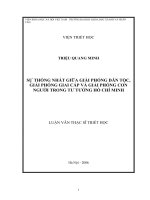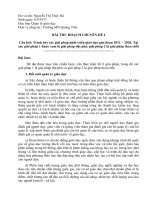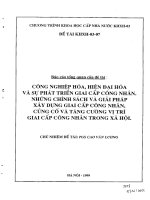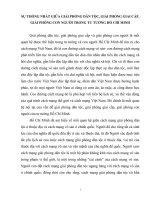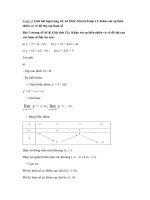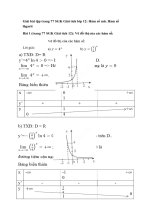20 câu ôn phần tiếng anh đánh giá năng lực đhqg tphcm phần 38 (bản word có giải)
Bạn đang xem bản rút gọn của tài liệu. Xem và tải ngay bản đầy đủ của tài liệu tại đây (127.1 KB, 11 trang )
20 câu ôn phần Tiếng Anh - Đánh giá năng lực ĐHQG TPHCM - Phần 38
(Bản word có giải)
1.2. TIẾNG ANH
Question 21-25. Choose a suitable word or phrase (marked A,B,C or D to fill in each blank)
21. I was amazed _______her knowledge of French literature.
A. with
B. about
C. at
D. of
22. Please send me a postcard as soon as you ______in London
A. will arrive
B. is going to arrive
C. have arrived
D. arrive
23. In this class, the students are talking _______than the teacher
A. loudly
B. more loud
C. loudlier
D. louder
C. extension
D. extensive
24. The clyclone caused ______damage to the city
A. extend
B. extended
25. I’m afraid we no longer sell that model of laptop because we had ____ a lot of complaints
A. so
B. such
C. enough
D. too
Question 26-30. Each of the following sentences has one error (A,B,C, or D). Find it and blacken your
choice on your answer sheet
26. If you strictly follow your moral principles, you will be sure that you are a honest person.
A. strictly follow
B. principles
C. sure that
D. a
27. The best-known members of the cabbage vegetable group includes head cabbage, califlower and
broccoli
A. best-known
B. vegetable
C. includes
D. califlower
28. By the time the police come, the robber had run away
A. By the time
B. come
C. had run
D. away
29. It is essential that each of us is responsible for our wrongdoings.
A. that
B. is
C. for
D. wrongdoings
30. There are differences and similarities between Vietnamese and American culture
A. are
B. similarities
C. Vietnamese
Question 31-35. Which of the following best restates each of the given sentences?
31. “If I were you, I would take the job” said my room-mate
A. My room-mate was thinking about taking the job
B. My room-mate advised me to take the job
C. My room-mate introduced the idea of taking the job to me
D. My room-mae insisted on taking the job for me
32. It is much more difficult to speak English than to speak French
D. culture
A. To speak French is more difficult than to speak English
B. To speak English is more difficult than to speak French
C. Speaking English is more difficult than to speak French
D. Speaking French is not as difficult as to speaking English.
33. David continued to smoke even though we had advised him to quit.
A. David took our advice so he stopped smoking.
B. If we had advised David, he would have quit smoking.
C. David did not quit smoking because of our advice.
D. Despite being told not to smoke, David continued to do.
34. Mary tried to keep calm although she was very disappointed.
A. Mary was too disappointed to keep calm.
B. Disappointed as she was, Mary tried to keep calm.
C. Mary lost her temper because of her disappointment.
D. Feeling disappointed, Mary tried to keep calm, but she failed.
35. He cannot afford a new computer.
A. The new computer is so expensive that he cannot buy it.
B.Therefore, he would buy a new computer.
C. So, he would buy a new computer.
D. The new computer is so expensive but he can buy it.
Question 36-40. Read the passage carefully
It is commonly believed in the United States that school is where people go to get as education.
Nevertheless, it has been said that today children interrupt their education to go to school. The distinction
between schooling and education implied by this remark is important.
Education is much more open-ended and all-inclusive than schooling. Education knows no bounds. It
can take place where, whether in the shower or on the job, whether in a kitchen or on a tractor. It includes
both the formal learning that takes place in schools and the whole universe of informal learning. The
agents of education can range from a reserved grandparent to the people debating politics on the radio,
from a child to a distinguished scientist. Whereas schooling has certain predictability, education quite
often produce surprise. A change conversation with a stranger may lead a person to discover how little is
know of other religions.
People are engaged in education from infancy on. Education, then, is a very broad, inclusive term. It is
a lifelong process, a process that starts long before the start of school and one that should be an integral
part of one’s entire life. Schooling, on the other hand, is a specific, formalized process, whose general
pattern varies little from one setting to the next. Throughout a country, children arrive at school at
approximately the same time, take assigned seats, are taught by an adult, use similar textbook, do
homework, take exams, and so on.
The slices of reality that are to be learnt, whether they are the alphabet or an understanding of the
workings of government, have usually been limited by the boundaries of the subject being taught. For
example, high school students know that they are not likely to find out in their class the truth about
political problems in their communities or what the newest filmmakers are experimenting with. There are
definite conditions surrounding the formalized process of schooling
Choose an option (A, B, C or D) that best answers each question.
36. What does the author probably mean by using the expression “children interrupt their education to
go to school?”
A. Going to several different schools is educationally beneficial
B. School vacations interrupt the continuity of the school year.
C. Summer school makes the school year too long.
D. All of life is an education.
37. The word “bounds” is closest in meaning to __________
A. rules
B. experiences
C. limits
D. expectation
C. boundaries
D. seats
38. The word “they” refers to__________
A. slices of reality
B. similar textbooks
39. The passage supports which of the following conclusions?
A. Without formal education, people would remain ignorant
B. Education systems need to be radically reformed.
C. Going to school is only part of how people become educated.
D. Education involves many years of professional training
40. The passage is organized by____________
A. listing and discussing several educational problems
B. contrasting the meanings of two related words
C. narrating a story about excellent teachers
D. giving examples of different kinds of schools
HƯỚNG DẪN GIẢI CHI TIẾT
1.2. TIẾNG ANH
Question 21-25. Choose a suitable word or phrase (marked A,B,C or D to fill in each blank)
21. I was amazed _______her knowledge of French literature.
A. with
B. about
C. at
D. of
Phương pháp giải:
Giới từ
Giải chi tiết:
Be amazed by/at sth. ngạc nhiên bởi cái gì
Tạm dịch: Tơi ngạc nhiên bởi kiến thức hơn về văn học Pháp.
22. Please send me a postcard as soon as you ______in London
A. will arrive
B. is going to arrive
C. have arrived
D. arrive
Phương pháp giải:
Thì của động từ
Giải chi tiết:
Khơng dùng thì tương lai đơn/ tương lai gần trong mệnh đề quan hệ chỉ thời gian
“send” => động từ chia ở hiện tại => loại C
Cấu trúc. S + V (present simple/ imperative structure) + as soon as/when + S + V (present simple)
Tạm dịch. Vui lịng gửi cho tơi một tấm bưu thiếp ngay khi bạn đến Luân Đôn
23. In this class, the students are talking _______than the teacher
A. loudly
B. more loud
C. loudlier
D. louder
Phương pháp giải:
Cấu trúc so sánh
Giải chi tiết:
Loud (adj) => Loud/Loudly (adv)
Khi chuyển so sánh hơn. louder/more loudly
Lưu ý. Với những tính từ tận cùng bằng “y” thì mới coi nó là tính từ ngắn. Bản thân từ loudly là sự kết
hợp của loud + ly => trạng từ dài bình thường
Tạm dịch: Học sinh trong lớp nói chuyện còn to hơn cả giáo viên
24. The clyclone caused ______damage to the city
A. extend
B. extended
Phương pháp giải:
Từ loại
Giải chi tiết:
A. extend (v) mở rộng
B. extended (adj). được mở rộng
C. extension (n). sự mở rộng
C. extension
D. extensive
D. extensive (adj) diện rộng, mang tính phủ khắp
Tạm dịch. Clyclone gây ra thiệt hại trên diện rộng cho thành phố
25. I’m afraid we no longer sell that model of laptop because we had ____ a lot of complaints
A. so
B. such
C. enough
D. too
Phương pháp giải:
Trạng từ chỉ mức độ
Giải chi tiết:
So + much/many + N. rất nhiều..
Such + a lot of + N . rất nhiều…
Enough + N. đủ…
Too + much/many + N. quá…
Tạm dịch. Tôi e rằng chúng tôi khơng cịn bán mẫu máy tính xách tay đó nữa vì chúng tơi đã có rất nhiều
khiếu nại
Question 26-30. Each of the following sentences has one error (A,B,C, or D). Find it and blacken your
choice on your answer sheet
26. If you strictly follow your moral principles, you will be sure that you are a honest person.
A. strictly follow
B. principles
C. sure that
D. a
Phương pháp giải:
Mạo từ
Giải chi tiết:
Honest / ˈɒnɪst/ bắt đầu bằng âm nguyên âm /ɒ/ => dùng mạo từ “an”
Tạm dịch. Nếu bạn tuân thủ nghiêm ngặt các nguyên tắc đạo đức của mình, bạn sẽ chắc chắn rằng bạn là
một người trung thực.
27. The best-known members of the cabbage vegetable group includes head cabbage, califlower and
broccoli
A. best-known
B. vegetable
C. includes
D. califlower
Phương pháp giải:
Sự hòa hợp chủ ngữ - động từ
Giải chi tiết:
N1 + of + N2 => chủ ngữ chia theo N1
The best-known members là danh từ số nhiều => động từ chia số nhiều
Sửa. includes => include
Tạm dịch. Các thành viên nổi tiếng nhất của nhóm rau bắp cải bao gồm bắp cải đầu, súp lơ xanh và bông
cải xanh
28. By the time the police come, the robber had run away
A. By the time
Phương pháp giải:
Sự phối hợp thì
B. come
C. had run
D. away
Giải chi tiết:
By the time + S + V (past simple), S + V (past perfect)
Sửa. come => came
Tạm dịch. Trước cảnh sát ập đến, tên cướp đã bỏ chạy.
Chọn. B
29. It is essential that each of us is responsible for our wrongdoings.
A. that
B. is
C. for
D. wrongdoings
Phương pháp giải:
Thức giả định
Giải chi tiết:
It + is/was + adj + THAT + S + (should) + V (bare)
Sửa. is => be
*adj. essential, necessary, recommended, urgent, mandatory, obligatory, suggested, imperative…
Tạm dịch. Điều cần thiết là mỗi chúng ta phải chịu trách nhiệm về những việc làm sai trái của mình
30. There are differences and similarities between Vietnamese and American culture
A. are
B. similarities
C. Vietnamese
Phương pháp giải:
Danh từ số nhiều
Giải chi tiết:
Vietnamese and Americian ( đang đề cập đến 2 đối tượng)
Culture là danh từ đếm được
Sửa. culture => cultures
Tạm dịch. Văn hóa Việt Nam và Mỹ có những điểm khác biệt và tương đồng
Question 31-35. Which of the following best restates each of the given sentences?
31. “If I were you, I would take the job” said my room-mate
A. My room-mate was thinking about taking the job
B. My room-mate advised me to take the job
C. My room-mate introduced the idea of taking the job to me
D. My room-mae insisted on taking the job for me
Phương pháp giải:
gián tiếp
Giải chi tiết:
If I were you => mang hàm ý lời khuyên
Advise sb to do sth. khuyên ai đó làm gì
A. think about. suy nghĩ về điều gì
C. introduce sth to sb. giới thiệu cái gì cho ai
D. insist on doing sth. khăng khăng làm gì
D. culture
Tạm dịch. "Nếu tôi là bạn, tôi sẽ nhận công việc" bạn cùng phịng của tơi nói
A. Bạn cùng phịng của tôi đang nghĩ về việc nhận công việc
B. Người bạn đời khuyên tôi nên nhận công việc
C. Người bạn cùng phịng của tơi đã giới thiệu ý tưởng nhận cơng việc cho tơi
D. Mae phịng của tơi khăng khăng muốn nhận công việc cho tôi
32. It is much more difficult to speak English than to speak French
A. To speak French is more difficult than to speak English
B. To speak English is more difficult than to speak French
C. Speaking English is more difficult than to speak French
D. Speaking French is not as difficult as to speaking English.
Phương pháp giải:
so sánh
Giải chi tiết:
S1 + V + comperative adverb + than + S2 + V
Loại A vì sai nghĩa
Loại C, D vì khơng cấu trúc khơng đồng dạng
Tạm dịch. Nói tiếng Anh khó hơn nhiều so với nói tiếng Pháp
= Nói tiếng Anh khó hơn nói tiếng Pháp
33. David continued to smoke even though we had advised him to quit.
A. David took our advice so he stopped smoking.
B. If we had advised David, he would have quit smoking.
C. David did not quit smoking because of our advice.
D. Despite being told not to smoke, David continued to do.
Phương pháp giải:
Cấu trúc nhượng bộ
Giải chi tiết:
David vẫn tiếp tục hút thuốc mặc dù chúng tôi đã khuyên anh ấy bỏ thuốc lá.
A. David đã nghe theo lời khuyên của chúng tôi để anh ấy ngừng hút thuốc. => sai nghĩa
B. Nếu chúng tôi khuyên David, anh ấy đã bỏ thuốc lá. => sai nghĩa
C. David đã khơng bỏ thuốc lá vì lời khun của chúng tôi. => sai nghĩa
D. Mặc dù được yêu cầu không được hút thuốc, nhưng David vẫn tiếp tục làm.
34. Mary tried to keep calm although she was very disappointed.
A. Mary was too disappointed to keep calm.
B. Disappointed as she was, Mary tried to keep calm.
C. Mary lost her temper because of her disappointment.
D. Feeling disappointed, Mary tried to keep calm, but she failed.
Phương pháp giải:
Cấu trúc nhượng bộ
Giải chi tiết:
Although + S + V, S + V = Adj/adv + as/though + S + V, S + V. dù cho…
Tạm dịch.
Mary cố gắng giữ bình tĩnh mặc dù cơ ấy rất thất vọng.
A. Mary đã quá thất vọng để giữ bình tĩnh.
B. Buồn bã như hiện tại, Mary cố gắng giữ bình tĩnh.
C. Mary mất bình tĩnh vì thất vọng.
D. Bởi vì cảm thấy thất vọng, Mary cố gắng giữ bình tĩnh, nhưng cơ ấy đã thất bại.
35. He cannot afford a new computer.
A. The new computer is so expensive that he cannot buy it.
B.Therefore, he would buy a new computer.
C. So, he would buy a new computer.
D. The new computer is so expensive but he can buy it.
Phương pháp giải:
Cấu trúc so..that
Giải chi tiết:
Cannot afford sth = sth is so expensive that sb cannot do sth
Tạm dịch. Anh ta không đủ tiền mua một chiếc máy tính mới.
A. Máy tính mới quá đắt nên anh ấy khơng thể mua được.
B. Do đó, anh ấy sẽ mua một chiếc máy tính mới.
C. Vì vậy, anh ấy sẽ mua một chiếc máy tính mới.
D. Máy tính mới rất đắt nhưng anh ấy có thể mua được.
Question 36-40. Read the passage carefully
It is commonly believed in the United States that school is where people go to get as education.
Nevertheless, it has been said that today children interrupt their education to go to school. The distinction
between schooling and education implied by this remark is important.
Education is much more open-ended and all-inclusive than schooling. Education knows no bounds. It
can take place where, whether in the shower or on the job, whether in a kitchen or on a tractor. It includes
both the formal learning that takes place in schools and the whole universe of informal learning. The
agents of education can range from a reserved grandparent to the people debating politics on the radio,
from a child to a distinguished scientist. Whereas schooling has certain predictability, education quite
often produce surprise. A change conversation with a stranger may lead a person to discover how little is
know of other religions.
People are engaged in education from infancy on. Education, then, is a very broad, inclusive term. It is
a lifelong process, a process that starts long before the start of school and one that should be an integral
part of one’s entire life. Schooling, on the other hand, is a specific, formalized process, whose general
pattern varies little from one setting to the next. Throughout a country, children arrive at school at
approximately the same time, take assigned seats, are taught by an adult, use similar textbook, do
homework, take exams, and so on.
The slices of reality that are to be learnt, whether they are the alphabet or an understanding of the
workings of government, have usually been limited by the boundaries of the subject being taught. For
example, high school students know that they are not likely to find out in their class the truth about
political problems in their communities or what the newest filmmakers are experimenting with. There are
definite conditions surrounding the formalized process of schooling
Choose an option (A, B, C or D) that best answers each question.
36. What does the author probably mean by using the expression “children interrupt their education to
go to school?”
A. Going to several different schools is educationally beneficial
B. School vacations interrupt the continuity of the school year.
C. Summer school makes the school year too long.
D. All of life is an education.
Phương pháp giải:
Đọc hiểu chi tiết
Giải chi tiết:
Tác giả có lẽ muốn nói gì khi sử dụng thành ngữ “trẻ em làm gián đoạn việc học của chúng để
đi học?"
A. Đi học nhiều trường khác nhau có lợi về mặt giáo dục
B. Các kỳ nghỉ học làm gián đoạn tính liên tục của năm học.
C. Học hè khiến năm học quá dài.
D. Cả cuộc đời là một nền giáo dục.
Thông tin. It is commonly believed in the United States that school is where people go to get as
education. Nevertheless, it has been said that today children interrupt their education to go to school
Tạm dịch. Ở Hoa Kỳ, người ta thường tin rằng trường học là nơi mọi người đến để được giáo dục. Tuy
nhiên, người ta nói rằng ngày nay trẻ em gián đoạn việc học để đến trường
37. The word “bounds” is closest in meaning to __________
A. rules
B. experiences
C. limits
D. expectation
C. boundaries
D. seats
Phương pháp giải:
Từ vựng
Giải chi tiết:
Từ “giới hạn” gần nghĩa nhất với __________
38. The word “they” refers to__________
A. slices of reality
Phương pháp giải:
Đại từ
B. similar textbooks
Giải chi tiết:
Từ “they” thay thế cho____
A. slices of realityB. similar textbooks
C. boundaries D. seats
Thông tin. The slices of reality that are to be learnt, whether they are the alphabet or an understanding of
the workings of government, have usually been limited by the boundaries of the subject being taught
Tạm dịch. Các phần thực tế sẽ được học, cho dù đó là bảng chữ cái hay sự hiểu biết về hoạt động của
chính phủ, thường bị giới hạn bởi ranh giới của chủ đề được dạy.
39. The passage supports which of the following conclusions?
A. Without formal education, people would remain ignorant
B. Education systems need to be radically reformed.
C. Going to school is only part of how people become educated.
D. Education involves many years of professional training
Phương pháp giải:
Đọc hiểu suy luận
Giải chi tiết:
Đoạn văn hỗ trợ kết luận nào sau đây?
A. Nếu khơng có giáo dục chính quy, mọi người sẽ vẫn dốt nát
B. Hệ thống giáo dục cần được cải cách triệt để.
C. Đi học chỉ là một phần trong cách mọi người trở nên có học thức.
D. Giáo dục liên quan đến đào tạo chuyên nghiệp nhiều năm
Thông tin. People are engaged in education from infancy on. Education, then, is a very broad, inclusive
term. It is a lifelong process, a process that starts long before the start of school and one that should be an
integral part of one’s entire life
Tạm dịch. Mọi người tham gia vào giáo dục từ khi cịn nhỏ. Vì vậy, giáo dục là một thuật ngữ rất rộng,
bao hàm. Đó là một q trình suốt đời, một quá trình bắt đầu từ rất lâu trước khi bắt đầu đi học và phải là
một phần không thể thiếu trong toàn bộ cuộc đời của một người
40. The passage is organized by____________
A. listing and discussing several educational problems
B. contrasting the meanings of two related words
C. narrating a story about excellent teachers
D. giving examples of different kinds of schools
Phương pháp giải:
Đọc hiểu suy luận
Giải chi tiết:
Đoạn văn được tổ chức bởi____________
A. liệt kê và thảo luận một số vấn đề giáo dục
B. đối chiếu nghĩa của hai từ liên quan
C. kể lại một câu chuyện về những người thầy xuất sắc
D. đưa ra các ví dụ về các loại trường học khác nhau
Thông tin. It is commonly believed in the United States that school is where people go to get as
education. Nevertheless, it has been said that today children interrupt their education to go to school
Tạm dịch. Ở Hoa Kỳ, người ta thường tin rằng trường học là nơi mọi người đến để được giáo dục. Tuy
nhiên, người ta nói rằng ngày nay trẻ em gián đoạn việc học để đến trường
Chú ý khi giải:
Nội dung dịch
Ở Hoa Kỳ, người ta thường tin rằng trường học là nơi mọi người đến để được giáo dục. Tuy nhiên, người
ta nói rằng ngày nay trẻ em gián đoạn việc học để đến trường. Sự phân biệt giữa đi học và giáo dục được
ngụ ý trong nhận xét này là quan trọng.
Giáo dục mang tính cởi mở và tồn diện hơn nhiều so với giáo dục ở trường. Giáo dục khơng có giới hạn.
Nó có thể diễn ra ở đâu, dù đang tắm hay đang làm việc, dù là trong bếp hay trên máy kéo. Nó bao gồm
cả việc học chính thức diễn ra trong trường học và toàn bộ vũ trụ của việc học khơng chính thức. Tác
nhân của giáo dục có thể bao gồm từ một ơng bà kín đáo đến những người tranh luận về chính trị trên đài
phát thanh, từ một đứa trẻ đến một nhà khoa học nổi tiếng. Trong khi việc học ở trường có khả năng dự
đốn nhất định, thì giáo dục thường tạo ra bất ngờ. Một cuộc trò chuyện thay đổi với một người lạ có thể
khiến một người khám phá ra những điều ít biết về các tơn giáo khác.
Mọi người tham gia vào giáo dục từ khi cịn nhỏ. Vì vậy, giáo dục là một thuật ngữ rất rộng, bao hàm. Đó
là một q trình suốt đời, một q trình bắt đầu từ rất lâu trước khi bắt đầu đi học và phải là một phần
khơng thể thiếu trong tồn bộ cuộc đời của một em. Mặt khác, đi học là một q trình cụ thể, được chính
thức hóa, mà khn mẫu chung của nó thay đổi rất ít từ bối cảnh này sang bối cảnh khác. Trên khắp một
quốc gia, trẻ em đến trường gần như cùng giờ, ngồi vào chỗ được chỉ định, được người lớn dạy, sử dụng
sách giáo khoa tương tự, làm bài tập về nhà, làm bài kiểm tra, v.v. Các phần thực tế sẽ được học, cho dù
đó là bảng chữ cái hay sự hiểu biết về hoạt động của chính phủ, thường bị giới hạn bởi ranh giới của chủ
đề được giảng dạy. Ví dụ, học sinh trung học biết rằng họ khơng có khả năng tìm ra sự thật trong lớp về
các vấn đề chính trị trong cộng đồng của họ hoặc những gì các nhà làm phim mới nhất đang thử nghiệm.
Có những điều kiện nhất định xung quanh quá trình đi học được chính thức hóa
